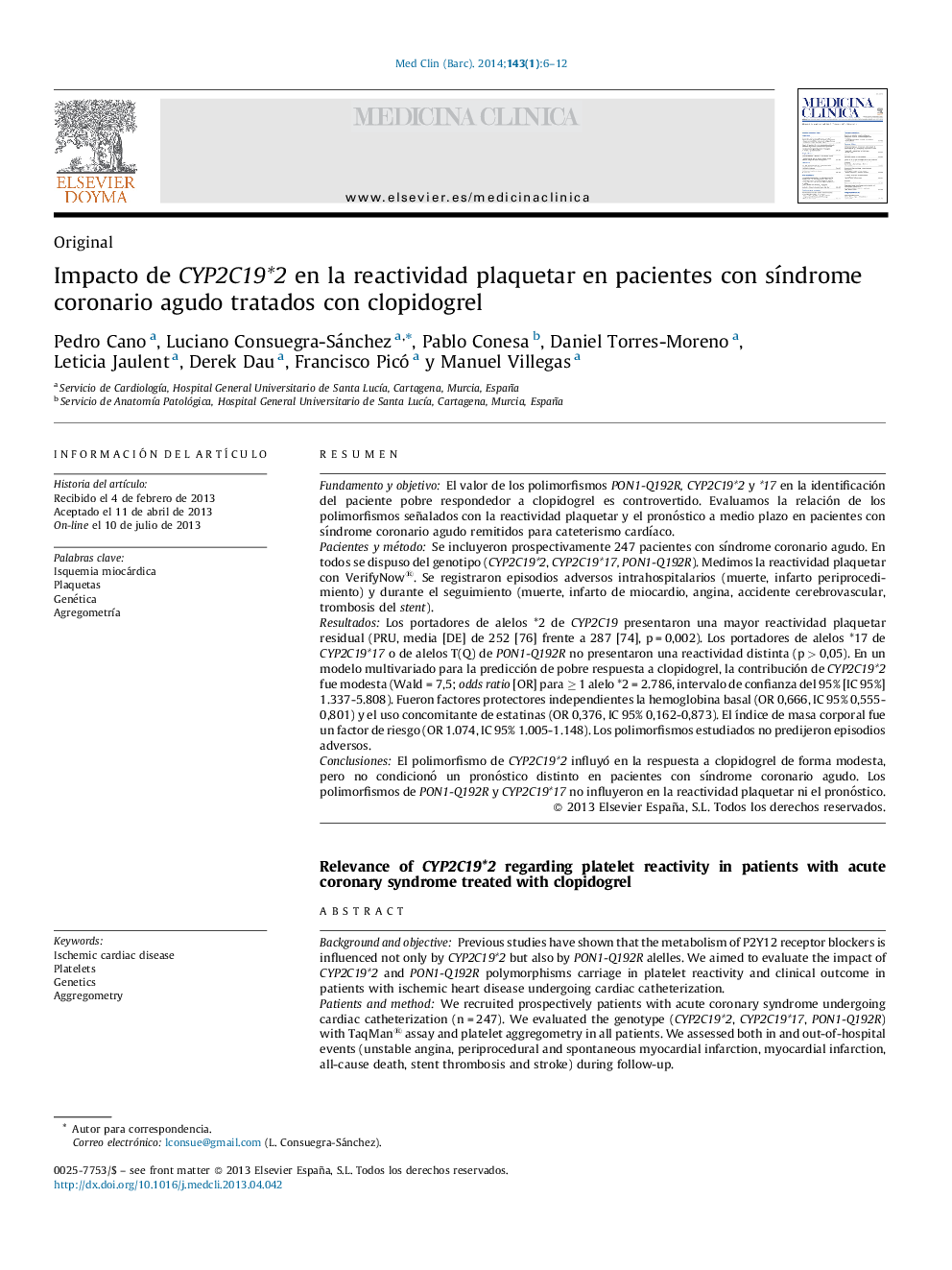| کد مقاله | کد نشریه | سال انتشار | مقاله انگلیسی | نسخه تمام متن |
|---|---|---|---|---|
| 3797746 | 1244256 | 2014 | 7 صفحه PDF | دانلود رایگان |

ResumenFundamento y objetivoEl valor de los polimorfismos PON1-Q192R, CYP2C19*2 y *17 en la identificación del paciente pobre respondedor a clopidogrel es controvertido. Evaluamos la relación de los polimorfismos señalados con la reactividad plaquetar y el pronóstico a medio plazo en pacientes con síndrome coronario agudo remitidos para cateterismo cardíaco.Pacientes y métodoSe incluyeron prospectivamente 247 pacientes con síndrome coronario agudo. En todos se dispuso del genotipo (CYP2C19*2, CYP2C19*17, PON1-Q192R). Medimos la reactividad plaquetar con VerifyNow®. Se registraron episodios adversos intrahospitalarios (muerte, infarto periprocedimiento) y durante el seguimiento (muerte, infarto de miocardio, angina, accidente cerebrovascular, trombosis del stent).ResultadosLos portadores de alelos *2 de CYP2C19 presentaron una mayor reactividad plaquetar residual (PRU, media [DE] de 252 [76] frente a 287 [74], p = 0,002). Los portadores de alelos *17 de CYP2C19*17 o de alelos T(Q) de PON1-Q192R no presentaron una reactividad distinta (p > 0,05). En un modelo multivariado para la predicción de pobre respuesta a clopidogrel, la contribución de CYP2C19*2 fue modesta (Wald = 7,5; odds ratio [OR] para ≥ 1 alelo *2 = 2.786, intervalo de confianza del 95% [IC 95%] 1.337-5.808). Fueron factores protectores independientes la hemoglobina basal (OR 0,666, IC 95% 0,555-0,801) y el uso concomitante de estatinas (OR 0,376, IC 95% 0,162-0,873). El índice de masa corporal fue un factor de riesgo (OR 1.074, IC 95% 1.005-1.148). Los polimorfismos estudiados no predijeron episodios adversos.ConclusionesEl polimorfismo de CYP2C19*2 influyó en la respuesta a clopidogrel de forma modesta, pero no condicionó un pronóstico distinto en pacientes con síndrome coronario agudo. Los polimorfismos de PON1-Q192R y CYP2C19*17 no influyeron en la reactividad plaquetar ni el pronóstico.
Background and objectivePrevious studies have shown that the metabolism of P2Y12 receptor blockers is influenced not only by CYP2C19*2 but also by PON1-Q192R alelles. We aimed to evaluate the impact of CYP2C19*2 and PON1-Q192R polymorphisms carriage in platelet reactivity and clinical outcome in patients with ischemic heart disease undergoing cardiac catheterization.Patients and methodWe recruited prospectively patients with acute coronary syndrome undergoing cardiac catheterization (n = 247). We evaluated the genotype (CYP2C19*2, CYP2C19*17, PON1-Q192R) with TaqMan® assay and platelet aggregometry in all patients. We assessed both in and out-of-hospital events (unstable angina, periprocedural and spontaneous myocardial infarction, myocardial infarction, all-cause death, stent thrombosis and stroke) during follow-up.ResultsCarriers of CYP2C19*2 alleles showed a significant higher residual platelet reactivity (PRU, mean [SD], 252 [76] vs. 287 [74], P = .002). Carriers of PON1-Q192R CT(RQ) and TT(QQ) alleles and CYP2C19*17 did not present a different response to clopidogrel. In a multivariable setting for the prediction of platelet reactivity, the contribution of CYP2C19*2 was modest (Wald = 7.5; odds ratio [OR] for ≥ 1 alelle *2 = 2,786, 95% confidence interval [95% CI] 1,337-5,808). Independent predictors were baseline hemoglobin levels (g/dL, OR .666, 95% CI .555-.801) and the use of statins (OR .376, 95% CI .162-.873). Body mass index was a risk factor (OR 1,074, CI 95% 1,005-1,148). Studied polymorphisms did not predict an adverse outcome.ConclusionsCYP2C19*2 polymorphism influenced moderately platelet reactivity but did not show an impact on clinical outcome in patients with acute coronary syndrome. Neither CYP2C19*17 nor PON1-Q192R polymorphisms showed an impact upon platelet reactivity or outcome.
Journal: Medicina Clínica - Volume 143, Issue 1, 7 July 2014, Pages 6–12